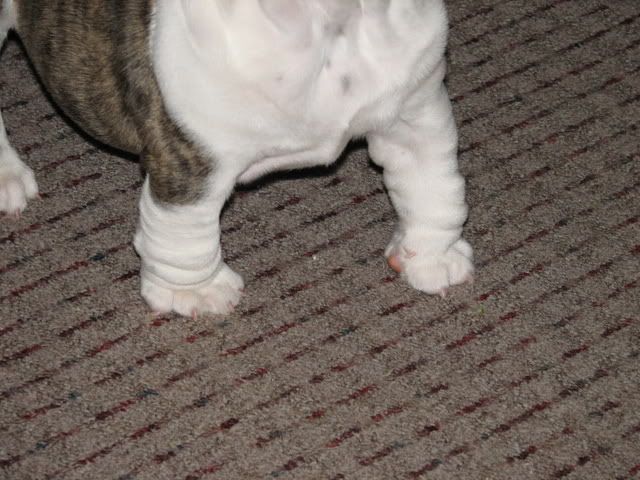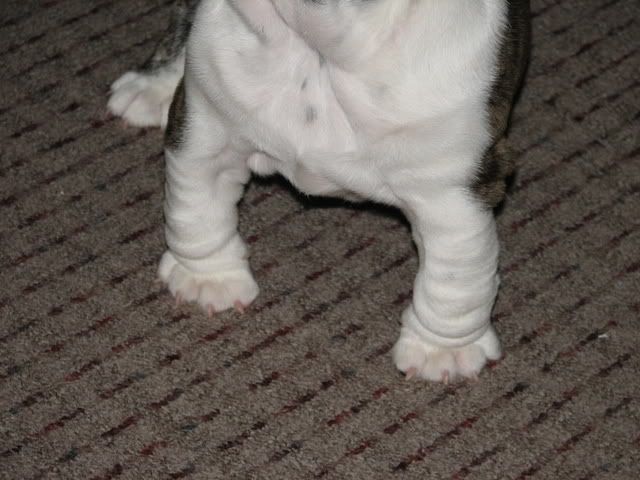Puppy with bowed legs ???
Bulldogs World Forum Archives
These archives contain a copy of the contents of the old Bulldogs World Forum for reference purposes.Posting is disabled in the archives.
Click here to visit the active Bulldog Forum
Puppy with bowed legs ???
Submitted by midnightramblin on April 20, 2010 - 10:27pmHas anyone ever had issues with a puppies front legs getting more and more bowed? I have a 9 week old female and her front legs are becoming more bowed each day. It is now to the point where she appears to be walking up on her toes and on the outside of her feet. We have been told this could be a protein issue, as in too much. I've heard this before, but just wanted more opinions. We took her to a non bulldog vet and they didn't have any answers. We see our bully vet on Friday.
Thanks,
Mike

More articles we recommend:


Puppy bone growth anomilies
A couple of observations from the limited research I have been able to do over time regarding bone growth anomalies in puppies;
It is unlikely to be rickets (a vitamin deficiency) if you are feeding a quality food. Additionally, excessive supplementation of vitamin C can inhibit the replacement of cartilage with bone at the growth plates and actually exacerbate the problem.
Bone growth anomalies in large and giant breeds are now attribute to the total energy level in foods, not the protein level. If you look at the labels on most good quality foods labeled for large breed puppies, they actually have high protein levels. One significant difference between large breed puppy food and "normal" puppy food is that the total energy measured in kcal/cup is lower. Most puppy foods will have 450 kcal/cup or higher, compared to large breed puppy foods which generally have 300 to 350 kcal/cup. The lower total energy is achieved by reducing the fat and carbohydrate content, which results in a lower calorie count with a higher portion of those calories coming from protein.
So why have Breeders had success in correcting or warding off bone growth anomalies using adult foods? The total energy in most adult foods is also much lower than standard puppy food. The risk we take in feeding adult foods to puppies to achieve the lower total energy desired is that their calcium levels and calcium to phosphorus ratios are geared to adult dogs instead of puppies. Calcium is not only needed for bone growth, but also the proper development and function of muscles and connective tissues.
I do also know of people who swear by a supplement called SureGrow 100. Google SureGrow 100 and you'll find a lot of info.
Good luck with your pup, and I do think a visit to your Bulldog knowledgeable vet is a good idea.
Dan
Re: PEDIGREE..
I have a friend that has been breeding Great Danes for a long time and Pedigree is the food that he puts his puppies on all the time .
Definitelty looks like Rickets to me
.

PEDIGREE..
get her on Pedigree adult (small crunchy bites) now. You will see an improvement quickly. Promise.
Forget any suppliments.
Lowest protein food you can get.
e
Cal Phos
Talked to old time breeder she said she had it happen in heavy boned pups her vet gave them injectable Cal Phos-solution made by Radix Lab. A good vet should know.
Cod Liver Oil...
More research...I know it's not dog specific but hopefully it's helpful.
Cod liver oil is most famous for contributing to bone health, preventing and reversing rickets in children and osteomalacia in adults.16, 17 Before the discovery of cod liver oil as a source of vitamin D, many children suffered greatly with deformed bones. Osteoporosis responds to vitamin D and to cod liver oil. Sufficient elongated omega-3 oils found in cod liver oil are one of the keys to keeping and rebuilding bone.18, 19 In women, higher levels of vitamin D from cod liver oil improve bone mineral density.20
Changing foods....
Yes I have heard of taking a puppy off of puppy food at a young age. Puppy foods are high in protein which can force bone growth. I usually make the change at around 4 months old. This pup looks to have more going on. I just found this additional information on rickets. It wouldn't hurt to call your vet to discuss it.
The illness of Rickets is present in young dogs due to the lack or deficiency of calcium or vitamin D. It is characterized by a tendency toward the formation of long bones in the legs. You will notice bone swellings developing in the extremities of the long bones.There is a tendency in puppies for the long bones to arch outwards due to the pressure of the body weight. In more advanced cases, the complete bone structure is deteriorated, and the dog has a lot of difficulties getting around. The lack of sunlight is also a contributing cause of rickets, as well as a bad diet. In order for the animal to recuperate, he must be under veterinarian treatment. The case can worsen notably, leading to an irreversible state.
Re: Could be rickets...
Sue,
I hadn't thought of that. I have been given a lot of advice to change to an adult food with less protein. What are your thoughts on this?
Mike
Could be rickets...
Rickets
General Information:
Rickets is a disease of young, growing animals. It is characterized by improper bone development. Typical signs include swelling of the joints and bending or bowing of the bones in the legs. Fractures occur easily because of poor bone development.
Rickets is caused by a dietary imbalance of calcium, phosphorus, and vitamin D. Because most dogs are fed commercial dog foods that are properly balanced, the disease is not common. Improper mineral supplementation or a diet high in meats can cause rickets.
Diet control is extremely important in treating rickets. Do not make any diet changes without consulting your veterinarian.
Notify your veterinarian if any of the following occur:
Your pet refuses to use one or more legs.
Your pet becomes increasingly weak.